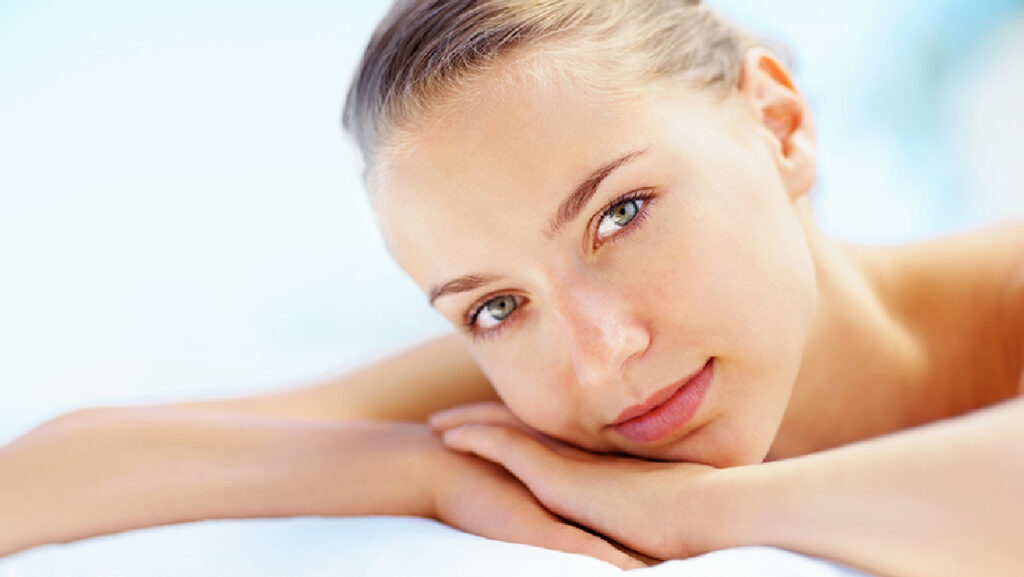When it comes to health, mental and physical wellness are top of mind. You go to the gym, eat clean and keep stress in check. But, what do you do for your skin? We’ve polled our experts for their advice; read on for their top tips for keeping your skin strong and healthy.
1. Drink Water
Drinking water may not directly impact your skin’s hydration levels, but it does benefit your largest organ indirectly. Your body requires proper hydration to carry out key functions that support healthy skin. When hydrated, it can move along beneficial fluids more effectively and flush unwanted toxins, helping to minimize inflammation and support your skin’s moisture barrier. Water is also essential to the production of structural proteins like collagen and elastin that keep your skin strong, plump and elastic. So, while eight glasses of water a day may not be the miracle cure you’re looking for, it does help you maintain a healthy, youthful looking complexion.
There are several ways to ensure your body is getting the hydration it needs. In addition to drinking water, you can incorporate water-rich foods into your daily diet. Foods like cucumber, tomatoes, watermelon and strawberries are more than 90% water, making them excellent sources of hydration. Another great pick: celery. Wellness expert Genieve Burley tells us, “Celery contains super nutrients! I predict celery juice will be the biggest health craze of 2019, and with good merit. Juicing celery takes out the fibrous stalk and concentrates all the potent vitamins and minerals contained in celery. It is also an alkalizer, anti-inflammatory and all around miracle plant.”
2. Load Up On Antioxidants
It’s no secret that antioxidants are skin care superstars. But, what do they really do? In short: Antioxidants neutralize and protect the body from free radicals. Free radicals are unstable and highly reactive molecules that come from a variety of sources, including air pollutants, chemicals, UV rays and cigarette smoke. These atoms are missing an electron and, in an effort to stabilize, seek out other molecules to bond to. If this continues to happen, it triggers oxidative stress which plays a role in premature aging of the skin.
Antioxidants are naturally occurring vitamins and minerals that fight free radicals by donating an electron, thereby reducing their reactivity and protecting the skin from damage. Your body produces antioxidants naturally, but you can also find them in everyday foods like berries and leafy greens, as well as surprising sources like coffee and popcorn. Here are some common antioxidants that are beneficial for your skin and the foods they can be found in:
- Vitamin C: Most fruits and vegetables, especially berries, oranges and bell peppers
- Vitamin A: Milk, butter and eggs
- Vitamin E: Nuts, seeds and leafy greens
- Beta-carotene: Brightly colored fruits and vegetables like carrots, mangoes and spinach
- Lycopene: Red and pink fruits and vegetables like watermelon and tomatoes
- Lutein: Leafy greens, corn, papaya and oranges
- Anthocyanin: Purple-colored foods like blueberries, pomegranates and beets
- Catechins: Green tea, dark chocolate, berries
3. Embrace Healthy Fats
Other key components of healthy skin are essential fatty acids (EFAs) like omega-3 (linolenic acid) and omega-6 (linoleic acid). These healthy fats serve as the building blocks of healthy cell membranes and are an integral component of the skin’s moisture barrier. In addition to helping the skin retain moisture and absorb beneficial vitamins and minerals, a healthy lipid barrier keeps out irritants that can cause dryness and inflammation.
Unlike antioxidants, EFAs cannot be synthesized by the body and must be sourced from your diet or topical skin care. Here are some sources of these beneficial fats:
- Omega-3: Salmon, mackerel, sardines, flaxseeds, chia seeds, walnuts, eggs
- Omega-6: Soybean oil, walnuts, sunflower seeds, almonds, cashews
A non-essential fatty acid (“non-essential” in that your body can produce it on its own) is omega-9 (oleic acid). These highly occlusive oils are particularly beneficial for dry skin due to their ability to seal in moisture and soften skin. Sources of omega-9 include extra virgin olive oil, rosehip oil, avocados, nuts and sesame oil.
4. Limit Sun Exposure
One of the greatest threats to healthy skin is sun exposure. UV rays are the prime cause of melanoma, which the Skin Cancer Foundation cites as the most common – and most dangerous – form of skin cancer. The American Cancer Society predicts that in 2019 alone, 96,480 new cases of melanoma will be diagnosed in the United States. The course of action to minimize your risk of developing melanoma is to protect yourself from exposure to UV rays: Seek shade, apply SPF and wear protective clothing.
Sun exposure also contributes to premature skin aging. Eminence Organics President Boldijarre Koronczay says: “UVA rays destroy collagen, contribute to a lack of elasticity and tone and cause thicker looking skin.” Sun damage can cause the skin to take on a leathery appearance, punctuated by the appearance of deep lines and wrinkles. Over time, age and liver spots also emerge due to sun damage that has accumulated over many years of exposure. In addition to protecting your skin with SPF, incorporate high quality after-care products into your routine to improve your chances of minimizing damage.
5. Curb Your Sugar Intake
Sugar is one of the worst offenders for aging your skin. Remember free radicals? In a process called glycation, sugar bonds with proteins to produce those same unstable molecules. Free radicals not only destroy collagen and elastin (structural proteins that keep your skin strong and supple) but also prevent your body from producing more. Without these essential building blocks, your skin loses its strength and elasticity, and fine lines and wrinkles begin to set in.
If you can’t fathom striking sweets from your diet, try swapping naughty for natural. Nike Trainer Betina Gozo suggests: “If you’re a gummy fiend like I am, switch out those cravings with something like berries, which are similar in size and sweetness to curb your cravings. If you are someone that loves chocolate, then make a smoothie with cacao or – my personal favorite – make “ice cream” with a frozen banana and add some dark chocolate chips!”
6. Limit Stress
From accelerating the aging process to increasing sensitivity and causing flare-ups, stress has an unfortunate way of showing up right where you don’t want it: on your skin. One way stress impacts your skin is by triggering the release of cortisol (aptly called the “stress hormone”). High cortisol levels accelerate the aging process by breaking down collagen and elastin; they also signal your skin to produce more oil, contributing to the development of acne. During times of stress, your body also releases inflammatory chemicals like interleukins as part of its fight or flight response. While inflammation is necessary to protect your health, it can exacerbate already uncomfortable skin conditions.
Breathe deeper. Take time to notice your breath. When the breath is shallow, it indicates the body is in contraction and tense.
A great way to limit stress is to take pause. Genieve suggests beginning your day with grounding exercises like deep breathing and meditation: “Breathe deeper. Take time to notice your breath. When the breath is shallow, it indicates the body is in contraction and tense. Take time to notice your breath, increase the length of the inhale and exhale and watch how your body relaxes.” Betina also touts the benefits of a meditative practice: “A newer thing I took up just two years ago was meditation – it has been such a game changer for me. It has helped me stay more grounded, less reactive and just overall more present and happy!”
7. Exercise Regularly
Regular exercise can do wonders for maintaining and improving the health of your skin. A sweaty workout raises your heart rate and increases blood circulation, which is necessary to deliver oxygen and essential vitamins and nutrients to your cells. Exercising regularly can also counteract the aging process by reducing cortisol levels and activating the release of healing endorphins. Genieve says: “Moving your body is medicine. It allows for detoxification by flushing all of the organs, it increases respiration, it lubricates joints and strengthens muscles. Breathing and moving can help balance hormones and move waste stagnating in the intestines. All of this leads to healthier, happier skin.”
One thing to keep in mind: Always cleanse your skin after a workout. Sweating is your skin’s natural way of detoxing but without a proper wash, any toxins that have been released can seep back into your pores. Allow yourself extra time post-workout to rinse sweat and debris from your skin so it can experience the full benefit of your workout.
8. Try A Digital Detox
One of this year’s top spa and wellness trends is to disconnect from your devices – especially before bed. Why? MindBodyGreen explains: “Shutting off electronics and light can help your body do what it needs to do in the evening: produce melatonin and wind down to go to sleep.” During REM sleep is the optimal time for your skin to repair and regenerate: Melatonin counteracts environmental damage, Human Growth Hormone accelerates cell regeneration and your body’s stem cells reproduce at a quicker rate.
Betina advises: “Stop scrolling on your phone or be on your computer at least 1 hour before bed. In fact, if you can, try to avoid all screens once the sun goes down! Ok, let’s be real, that’s almost impossible, so I suggest wearing blue light blockers. This will not only help you from damaging your eyes from the light of the screens, but once the sun goes down, your body will want to produce melatonin, but won’t if you are being exposed to that blue light! Get the most out of your sleep by blocking that light or staying away from those screens.”
9. Get 8 Hours Of Sleep
Getting enough sleep is just as essential as disconnecting before bed. In fact, studies reveal that lack of sleep contributes to more fine lines and wrinkles, uneven skin tone and less elasticity. Genieve emphasizes: “Get more sleep! Getting less than 8 hours of sleep is so last year…The more sleep you get, the healthier you are. All the repair processes occur when your body is in deep sleep. It’s during this time that hormones and neurotransmitters are produced that create optimal health, fight off disease and work on epidermal tissue, muscles and joints.” By getting enough hours of sleep, you give your body enough time to perform the functions that keep your skin healthy.
The more sleep you get, the healthier you are.
Experts also stress the importance of sleep quality. Michael Breus, Ph.D. and board-certified sleep specialist suggests keeping a consistent sleep-wake schedule to enhance your quality of sleep. He tells MindBodyGreen: “Each morning when you wake up at the same time, you get sunlight through your eyes, which helps reset your circadian rhythm. This reset impacts every organ system and every disease state. In addition, your brain then knows when to fall asleep and when to wake up, and this allows your sleep cycle to become more efficient, and increase deep sleep.”
10. Use Natural Skin Care
One of the best things you can do for your skin is to incorporate natural ingredients and products into your skin care routine. Choosing natural skin care ensures that you are not exposing your skin to harsh chemicals that can disrupt its moisture barrier and cause irritation and dryness. Additionally, natural, organic and Biodynamic® ingredients are packed with vitamins, minerals and antioxidant-rich ingredients that improve your skin’s health over time. Biodynamic crops alone have been found to contain up to 13% more potassium, 20% more sodium, 34% more iron and 47% more Vitamin C than conventionally grown ingredients.
At Eminence Organics, we keep your skin’s health top of mind. Our natural skin care is infused with fresh fruit pulps, plants and exotic spices that are sourced from organic and Biodynamic® farms worldwide. Choosing organic ingredients ensures that our products are rich in essential vitamins and nutrients and free of harmful chemicals like added parabens, petrolatum, mineral oils, propylene glycol and sodium lauryl sulfate.
How do you keep your skin healthy? Share your comments with us below and join the conversation on social media.
This post was written by Alisha Whitley from Eminence Organics.
You can find their blog here












